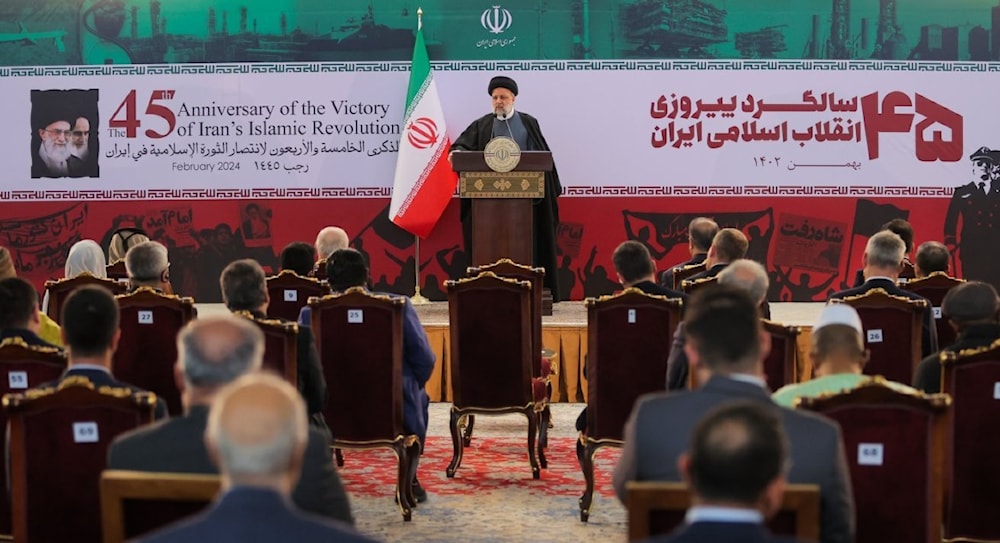US presence in region has no justification, disrupts security: Raisi
In an address to diplomats in Iran, the Iranian President has addressed multiple issues including the country's nuclear program.
-

Iranian President Ebrahim Raisi addresses foreign ambassadors to Iran on the occasion of the victory of the victory of the Islamic Revolution in Iran, in Tehran, Iran, on February 7, 2024. (Iranian Presidency)
There is no justification for the presence of American forces in the region, Iran’s President Ebrahim Raisi said on Wednesday.
Addressing ambassadors to Iran in a ceremony celebrating the anniversary of the victory of the Islamic Revolution, President Raisi said that foreign presence does not solve any problems in the regions but generates them instead.
"The Islamic Republic of Iran is the best friend for neighboring countries in difficult times," Raisi said.
The President reiterated that his government's policy is to cooperate with all other governments, adding that Tehran will "warmly shake hands with neighboring countries, Islamic countries, and [allies]."
He stressed that the American presence in the region has no possible justification, stressing that "Iran considers [regional insecurity] as insecurity for itself."
"We believe that the presence of Americans in Iraq, Syria, Afghanistan, and the region does not create security, but disrupts security," he underlined.
Read more: Iran, Saudi Arabia discuss potential security, defense cooperation
Iran's foreign policy marked by support to Palestine
The Iranian President also highlighted Tehran's support for Palestine, saying that it is a key aspect of the Islamic Republic of Iran's foreign policy. He pointed to the fact that this support started with the victory of the Islamic Revolution, which successive governments have ensured for 45 years.
On this point, Raisi said the West believes that the "fake" Israeli regime will be kept alive, via military and aggressive means, stressing, however, that eventually, victory will belong to the Palestinian people who will defeat the "Zionist regime".
Read more: Cutting Israeli ties is 'decisive blow' to entity: Sayyed Khamenei
Iran's nuclear program
During his address, Raisi also highlighted Iran's continued cooperation with the International Atomic Energy Agency (IAEA), ensuring its right to have a peaceful nuclear program. He emphasized a key aspect of Islamic jurisprudence, which forbids the use of nuclear weapons, due to their detrimental effects on society and innocent lives.
Iranian leader Sayyed Ali Khamenei had declared, at an earlier time, that it was forbidden for Iran to develop nuclear weapons. The religious ruling (fatwa) stated that the production, stockpiling, and use of nuclear weapons were forbidden under Islam.
Raisi reiterated this fatwa, stressing that nuclear weapons have no place in Islamic society.
Read more: Iran only non-nuclear nation to have such ballistic missile capability

 3 Min Read
3 Min Read








